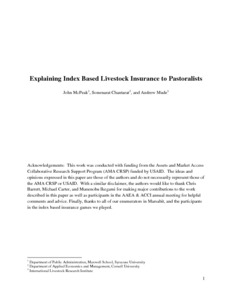Resource information
Livestock production in arid and semi-arid rangelands is a risky enterprise. Covariate risk of catastrophic livestock loss due to drought is the most critical uninsured risk facing livestock producers. These losses can lead to persistent poverty. We are trying to design an index based livestock insurance (IBLI) program as a viable means to help pastoralists in northern Kenya manage such covariate risk of livestock losses due to drought. A predicted livestock mortality index – established from a statistical relationship between satellite-generated vegetation imagery and historical records of community level livestock losses – represents an objectively, cost effectively measured and non-human manipulable index that triggers insurance payout. The insurance is offered by private insurance companies. The advantages of reduced transaction costs and asymmetric information problems, however, come at the cost of increased basis risk, which refers to the imperfect correlation between an insured?s loss experience and the index. We have developed a game that explains to pastoralists how such an insurance product could work. We built in the game both covariate and idiosyncratic shocks, and use a subsistence constraint to generate bifurcating asset dynamics, observed empirically in the targeted communities. This paper describes how the game was designed, how it was used in the field, and presents findings on how individuals played the game. The paper concludes by discussing how these findings are being used in the design and broader extension of the index based insurance product.



